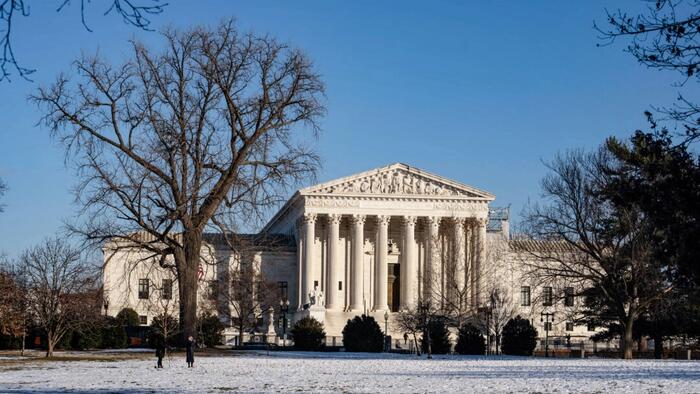Authored by Matthew Vadum via The Epoch Times (emphasis ours),
The U.S. Supreme Court voted 8–1 on Jan. 23 to allow the federal government to enforce an anti-money laundering law that a lower court blocked late last year.
Justice Ketanji Brown Jackson dissented from the new ruling.
The statute at issue, the federal Corporate Transparency Act (CTA), required millions of business entities to file information returns about their owners by Jan. 1, 2025.
An estimated 33 million small businesses face fines of as much as $591 per day should they fail to comply with the new rule, according to.a Treasury website.
Businesses with upwards of 20 employees, $5 million in annual sales, and a U.S. office qualify for exemptions from CTA reporting requirements.
The law provides that affected corporate entities must file reports with the federal government about their beneficial owners, which means individuals with substantial control over the entity or who own or control 25 percent of the entity.
Entities are required to provide the government with the names of their beneficial owners, along with their birthdates, addresses, and identifying information such as passport or driver’s license numbers.
The CTA’s reporting requirement was put on hold on Dec. 5, 2024, when the U.S. District Court for the Eastern District of Texas sided with challengers, granting a nationwide preliminary injunction—also known as a universal injunction—against the CTA.
The court found that the challengers would likely succeed with their claim that the act was unconstitutional.
On Dec. 13, 2024, the U.S. Department of Justice, acting on behalf of the Financial Crimes Enforcement Network (FinCEN), a federal agency, asked the U.S. Court of Appeals for the Fifth Circuit to stay the injunction.
The agency argued the law was constitutional and that the challenge to it would probably fail in the end.
The circuit court’s motions panel granted the government’s request on Dec. 23, 2024, and suspended the injunction pending appeal. FinCEN then extended the filing deadline for corporate entities to Jan. 13, 2025.
On Dec. 26, 2024, the circuit court performed an about-face and sent the case to its merits panel, which restored the injunction to “preserve the constitutional status quo while the merits panel considers the parties’ weighty substantive arguments.”
The new Supreme Court order states that the Fifth Circuit’s ruling upholding the injunction is “stayed pending the disposition of the appeal” in the circuit court.
The Fifth Circuit has scheduled oral argument in the case for March 25.
Jackson wrote in her dissenting opinion that there was “no need” for the nation’s highest court to lift the Fifth Circuit’s stay of the reporting requirement.
“However likely the government’s success on the merits may be, in my view, emergency relief is not appropriate because the applicant has failed to demonstrate sufficient exigency to justify our intervention,” the justice wrote.
She wrote that the circuit court agreed to expedite the government’s appeal, even though the government only moved to enforce the law almost four years after its passage by Congress.
The government’s argument that the law needs to be enforced immediately is undermined by “the fact that the harms it now says warrant our involvement were likely to occur during that period.”
The government has not shown if will suffer “injury of a more serious or significant nature … if the Act’s implementation is further delayed while the litigation proceeds in the lower courts.”
Supreme Court Justice Neil Gorsuch, a critic of universal injunctions, concurred with the court’s decision, but wrote that the Supreme Court should “go a step further and … take this case now to resolve definitively the question whether a district court may issue universal injunctive relief.”
In January 2020, Gorsuch criticized the growing practice of federal judges ruling beyond the scope of a particular case.
The Supreme Court should “confront” the “real problem” of nationwide injunctions, which raise “serious questions about the scope of courts’ equitable powers under Article III” of the Constitution, he wrote in a ruling.
That decision stayed a universal injunction that prevented the first Trump administration from enforcing its so-called public charge rule that blocked prospective immigrants from receiving permanent resident status if they were deemed likely to become dependent on government assistance.
The case is McHenry v. Texas Top Cop Shop.
The applicant, James R. McHenry, is a longtime U.S. Department of Justice employee who is serving as acting U.S. attorney general.
McHenry took over temporarily after then-Attorney General Merrick Garland resigned on Jan. 20, the day of President Donald Trump’s inauguration.
Trump has nominated Pam Bondi, former Florida attorney general, as the next U.S. attorney general. The Senate Judiciary Committee is scheduled to vote on her nomination on Jan. 29.
The lead respondent, Texas Top Cop Shop, is a police supply store in Conroe, Texas.
Janita Kan contributed to this report.
Loading…
Read the full article here

